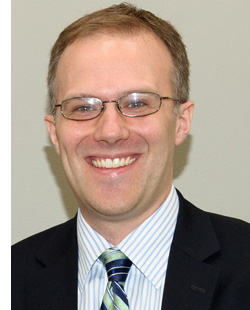
When I started graduate school, I assumed that I would pursue a career in academics. However, about halfway through my Ph.D., I realized that that was not the right career path for me. I had always been interested in government and passionate about public policy issues. I began to wonder whether I could combine my background in science with my interest in public service. However, when I started talking to the people I knew in science, most had no idea how to help me get started. Since then, I have met many other scientists who have had similar experiences after deciding to pursue a career outside the traditional academic and industrial tracks.
Now, six years after starting to think seriously about jumping into government, I have finished a year as an OSA/SPIE Congressional Fellow in the office of Sen. Richard J. Durbin (D.-Ill.) and started a new position in the U.S. Department of Energy as Special Assistant to the Secretary of Energy, Steven Chu. Recently, I’ve been asked by a number of grad students and post docs what steps I took to get these positions. I thought this would be a great opportunity to share some advice for current grad students who are trying to navigate a path into the policy world.
Make connections in the field. After finishing my Ph.D., I completed a master’s degree in public policy. Although an extra degree is not for everyone, it allowed me to meet people who have spent their careers working in policy. I was able to use these connections to track down scientists who had also worked in government. These people were fantastic resources, and they have served as role models at this early stage of my career.
Get involved. No matter how you end up getting your first policy position, you need to build a resume that shows more than your educational background and some papers you published. Take advantage of any opportunity you can find to demonstrate your interest in public issues. Volunteer for a political campaign, start a club at your university, write an op-ed for a local newspaper, or even just sit in on a class that deals with policymaking. Taking that first step may place you outside of your comfort zone, but subsequent steps will be easier.
Look for fellowships. Once you’ve gotten your start in policy, the science and technology policy fellowships sponsored by the American Association for the Advancement of Science are a fantastic way to get involved in the federal government. My OSA/SPIE Congressional Fellowship is part of that program. It was a fantastic experience that played a crucial role in helping me to find my current position.
Scientists typically have the ability to think outside the box and solve problems. Such skills are incredibly valuable, especially at a time when the U.S. government is faced with shrinking budgets and rising levels of debt. There is no time like the present for young scientists to bring their expertise to bear. All you need to do is dive in.
T.J. Augustine (tjaugustine3@gmail.com) is the Special Assistant to the Secretary at the United States Department of Energy. Prior to that, he was an OSA/SPIE/AAAS Congressional Fellow in the office of Sen. Richard J. Durbin and also worked as an intern in the White House Office of Science and Technology Policy. T.J. completed his Ph.D. in chemistry and a master’s degree in public policy at Stanford University.
